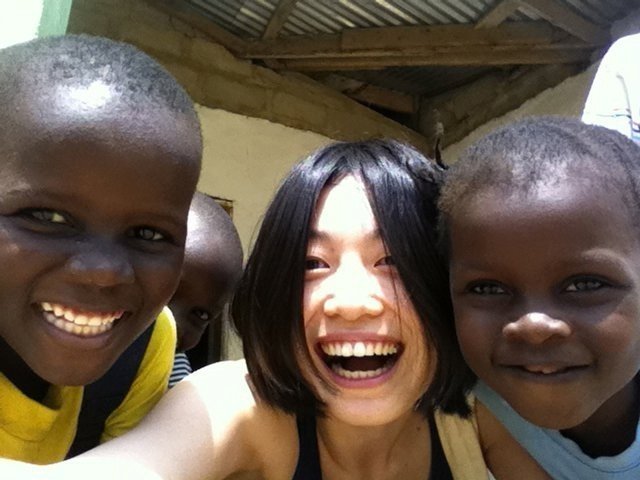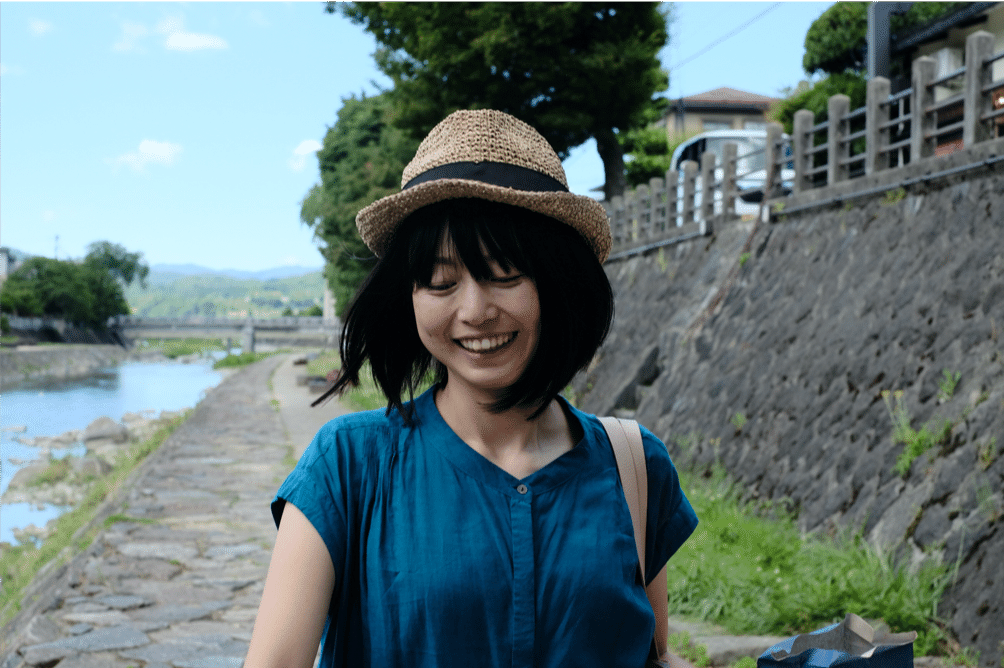
アフリカでお金が足りなくなったときのこと / 全国通訳案内士・翻訳家 白石実果 reasons why we travel
私は今、日本にやって来る外国人観光客をガイドする仕事をしている。日本各地に案内して独自の文化を紹介し、「日本のこんな暮らしを見てみたかった!」という想いを叶える仕事だ。
かれこれ10年ほど前。私がまだ、自分が将来ガイドの仕事をすることになると知らなかった頃。私はガーナのある難民キャンプに滞在していた。インターネットを使って世界の小さな想いをつなげたいと1年の旅に出た私は、ご縁がつながって、旅の途中、1ヶ月だけキャンプ内でコミュニティのI Tスキル向上のためのお手伝いをしていたのだ。
ある日。キャンプを離れ、私は隣町の郵便局まで出かけた。“トロトロ”を乗り継いで、日本にいる友人に贈り物を送ろうとしていたのだった。

トロトロ。かわいらしい響きのこの乗り物は、ガーナの乗合バス。日本で廃車寸前まで乗られた古いバンが、アフリカに運ばれ、「○○工務店」なんて日本語が書かれたまま、まだまだ現役で市民を乗せて町じゅうを走っている。
乗車賃は、市内だと30分乗って数十円。市外まで行くと100円。私が乗ったトロトロも、いろんなお客さんを乗せながらのんびりゆっくり隣の町まで進んでいく。

ガーナの郵便局は、はっきりいって面倒くさい。日本のように、「これ送りたいんです」「はい、わかりました」では終わらない。こっちの窓口で送付内容の申告、そっちの窓口で書類記入、あっちの窓口で内容物のチェック、最後に向こうまで行ってお支払い。虚偽の申告をしていないか、各窓口で厳しくチェックされる。せっかくきれいにラッピングされたプレゼントだって全部開かれて、チェックされた。私の送付物はお洒落すぎたため、「これは石鹸に見せかけた何かじゃないか?」なんて疑われてしまって、この日はいつも以上に精一杯説明しなくてはいけなかった。
長い時間をかけて説得が終わり、ようやく最後のお支払い。いよいよ日本にプレゼントを送れるのだ! 難民キャンプを出発してから、すでに数時間が経過していた。

しかし、いざお支払いをしようとすると…、100円足りない…! そう、さっき外国人向けのおしゃれなショップで買った石鹸が想定より高くて、お金が足りなくなってしまったのだ。帰りのトロトロ代を考えると、持っているお金を全て払うわけにはいかない。
「お金が足りないので、また明日来ます。その時は手続きも、もう一度やり直しますので」と告げて帰ろうとしたその時、後ろからすっと250円分のお札が差し出された。振り返ると、にっこり微笑む素敵なご夫婦だった。「いいのよ、私たちが払うから」。

アフリカに行くと、「援助」なんて言葉をよく聞く。「助ける側」と、「助けられる側」。わかりやすく簡単に切り分けようとしたら、世界は簡単にそんなふうにフォルダ分けされてしまう。
けれど、このアフリカのご夫婦は助けられる側の人たちなのだろうか? 私が出会ってきた人たちは、助けられる側の人たちなのだろうか? 目の前にいる人に、当たり前のように何かしたくなってしまう彼らは、本当に助けられるだけの立場なのだろうか。

西アフリカという、外国人観光客がほとんどいないこの国では、私が旅していると、たくさんの人が温かくサポートしてくれた。
トロトロに乗っていると、隣に乗り合わせた人が私の分まで支払いをしてくれたことが何度もあった。道を聞くと、タクシー乗り場まで連れて行ってくれて、料金交渉もしてくれて、タクシー代まで握らせてくれた人もいた。「この旅に出る前に仕事を辞めて来た」と言ったら、タクシードライバーさんは、私が働けそうな仕事を紹介してくれた。そして、面接のコツまで指導してくれたりもした。
目の前の人が困っていたら助けるし、自分が困っていたら助けを求める。人と人って、ただそれだけなんじゃないのかって、遠く離れたアフリカの地で、当たり前のことに気づいた。

そんな旅からもう、10年が経つ。私は、岐阜県飛騨市を拠点にして日本じゅうへ外国人を案内するガイドになった。
つい2週間ほど前のこと。京都でのガイドの仕事が終わり、宿のラウンジにいたら、「すみません。500円玉を100円玉に両替してもらえませんか?」と外国人に話しかけられた。どうやらコインランドリーを使いたいが、両替機が故障しているらしい。
「大丈夫、私が払うから」。私が同じセリフを言える時がやって来た。
【プロフィール】

白石実果(しらいし・みか)
全国通訳案内士・翻訳家。岐阜県飛騨市在住。世界を旅した後、外国人に日本の本質的な暮らしや文化を案内するガイドとなる。
瀬戸内への旅の玄関口
福山駅前のまちやど「AREA INN FUSHIMICHO FUKUYAMA CASTLE SIDE」
●公式Webサイト
住所:伏見町4-33 FUJIMOTO BLDG. 1F(RECEPTION)
AREA INN FUSHIMICHOは、まち全体をひとつの「宿」と見立てた「まちやど」です。泊まる、食べる、くつろぐ、学ぶ、遊ぶ、さまざまな要素がまちのなかに散りばめられています。チェックインを済ませたら、伏見町、そして福山のまちから瀬戸内への旅へ。
The time I was short on money in Africa [ A guide-interpreter / translator: Mika Shiraishi ]
I currently work as a guide for tourists coming to Japan from abroad. My job involves showing them around the country, introducing the unique culture found here, and granting their wishes to experience certain ways in which Japanese people live.
This is a story of something that happened roughly ten years ago, back when I still had no clue that I would be working as a guide in the future. I was staying in a certain refugee camp in Ghana. Having set out on a journey a year earlier in hopes of connecting the little minds of the world through the Internet, I was able to arrange a stay of just one month in this camp thanks to some my friends made on my travels so I could help improve the IT skills of its community.
One day, I left the camp and went to the post office in the next town over. I was trying to make a change via “tro tro” and send presents to friends in Japan.
The “tro tro”. This vehicle that makes a cute sound is a Ghanaian passenger bus. Old vans that had been driven almost to the point of being junked in Japan are sent to Africa, where they continue their services even longer, driving about town carrying passengers with the “XX Building Firm” still printed on their sides in Japanese.
The fare within the city is a few dozen yen for 30 minutes. It costs 100 yen (about one dollar) to go outside the city. The toro toro I rode made a leisurely progression to the next town, picking up various passengers along the way.
Post offices in Ghana are, frankly put, a real pain. No transaction ever ends with “I want to send a package” “Certainly” like they do in Japan. You report the details of what you’re sending at this window, fill out the paperwork at that window, get the package checked over at this other window, and then finally head over there to pay. They conduct strict screenings at each window to make sure there aren’t any falsehoods in your report. The presents I had went to such pains to wrap prettily were all opened and looked over. My packages were perhaps a little too nice looking, so the post office staff suspected of trying to disguise something else as soap, of all things. So, on this particular day I had to explain things even more thoroughly than usual.
After much time, I managed to convince them, and was finally able to move on to the payment part. At last, I can send my presents to Japan! Several hours had already passed since I departed from the refugee camp.
The thing is, once it became time to lay down the money...I was 100 yen short! That’s right, the soap I had bought at the fancy shop geared towards foreigners was more expensive than expected, and that was why didn’t have enough money. I had the toro-toro fare to think about, too, so I couldn’t just spend all the cash I had on hand.
“I don’t have enough money, so I’ll come back tomorrow. I’ll go through the whole process again when I do,” I stated, and was about to leave when someone quietly held out a bill for the equivalent of 250-yen (about 2.27 dollars) from behind me. I turned back to see a lovely couple with big smiles on their faces.
“Don’t worry, we’ll take care of it for you.”
“Aid” is a word you hear a lot when visiting Africa. There are offering aid, and those receiving it. If you divide everything up so simple and straightforward like that, it’s easy to simply assign everything in the world into neat little folders.
But, was this African couple really part of the side that receives aid? Were the people I had met during my travels part of that group too? I had to wonder if people like this couple who felt the urge to help someone before them like it was the natural thing to do were really in a position where all they were doing was receiving aid.
During my travels here, in this nation in West Africa that sees barely any tourists from overseas, I met so many people who offered me a friendly helping hand.
There were many times when I rode the toro-toro that someone sitting next to me ended up paying my fare as well. I also had people who, when I asked for directions, accompanied me to the taxi stand, negotiated prices for me, and even paid the cost of the ride. When I told the taxi driver that I had quit my job before starting my travels, he introduced me to some work that it seemed like I could do. He even coached me on what to say in the interview.
Offer help if you see a person in need, and ask for it if you’re the one who needs assistance. It took coming all the way to distant Africa for me to realize this very natural thing, that maybe this is an essential nature of interactions between people.
It’s been ten years now since that trip. I’ve become a guide based out of Hida in Gifu Prefecture who shows travelers from overseas around Japan. This is something that happened just two weeks ago. I had just finished a guide job in Kyoto and was in the lounge of the inn when a traveler came up to me and said, “Excuse me. Can you exchange this 500-yen coin for 100-yen coins?” He wanted to use the coin laundry machine, but apparently the moneychanger was out of order.
“It’s okay, I’ll pay for it.”
Now it was my turn to say those same words that the couple in Ghana had said to me that day.
Mika Shiraishi
A guide-interpreter/translator for all of Japan. Based out of Hida, Gifu Prefecture. After traveling the world, she now shows visitors from abroad the true lifestyle and culture of Japan.
